|
|
|
Sort Order |
|
|
|
Items / Page
|
|
|
|
|
|
|
| Srl | Item |
| 1 |
ID:
145244


|
|
|
|
|
| Summary/Abstract |
This article examines the intersection of Big Data and strategic intelligence from a theoretical-conceptual viewpoint. Adopting Popperian refutation as a starting point, it approaches methodological issues surrounding the incorporation of Big Data into the intelligence cycle, and argues that Big Data analytics is best used to discern long-term developments, generate intelligence hypotheses, and adduce refuting facts. The article then briefly examines the use of Big Data via social media, an increasingly fertile platform for intelligence analysis. Finally, the article argues that despite its potential in filling our epistemic gaps, Big Data should continue to complement traditional subject-matter expertise, supported by game theory, as part of a tripartite analytical framework for strategic intelligence consisting of ‘subtext’, ‘context’ and ‘metatext’. In this respect, Big Data may well become the midwife for more open modes of intelligence management and, ultimately, a more open society.
|
|
|
|
|
|
|
|
|
|
|
|
|
|
|
|
| 2 |
ID:
145238
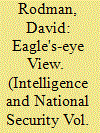

|
|
|
|
|
| Summary/Abstract |
The United States displayed a keen interest in the nature, progress and results of the Yom Kippur War, because the fighting was thought to reflect how non-nuclear hostilities between the North Atlantic Treaty Organization (NATO) and the Warsaw Pact (WP) would unfold on the plains of central Europe in case war broke out there. In contrast to many observers of the war, who concluded that the losses suffered by the Israel Defence Forces (IDF) at the hands of Egyptian and Syrian anti-aircraft and anti-tank weapons had rendered the aircraft and the tank largely impotent, thereby revolutionizing how wars would be waged in the future, Central Intelligence Agency (CIA) analysts and United States Army Training and Doctrine (TRADOC) Command officers, based upon an in-depth review of the nature, progress and results of the fighting, re-affirmed the centrality of these weapons systems on the modern battlefield. Rather than focus obsessively on technological developments, they concluded that training, leadership and tactics were ultimately the decisive elements in the Yom Kippur War.
|
|
|
|
|
|
|
|
|
|
|
|
|
|
|
|
| 3 |
ID:
145241
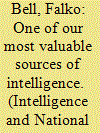

|
|
|
|
|
| Summary/Abstract |
During the Second World War, secret information derived from enemy prisoners of war (POWs) was a valuable asset to British intelligence. Until 1944, the POW system had expanded from a small interrogation camp in the Tower of London to a multi-step structure with the so-called Combined Services Detailed Interrogation Centre, United Kingdom (CSDIC(UK)) at its top. The methods employed to collect reliable information included microphones, stool pigeons and different interrogation techniques. The results were read by all services and several ministries which provided a unique insight into German capabilities, intentions and thoughts.
|
|
|
|
|
|
|
|
|
|
|
|
|
|
|
|
| 4 |
ID:
145242


|
|
|
|
|
| Summary/Abstract |
Looking at trends of professionalization of intelligence analysis within the United States Air Force as a subset of the broader US Intelligence Community, this paper calls for a re-evaluation of the professionalization of intelligence analysis away from a bureaucratic ‘corporateness’ approach examining the traits of a profession. Instead, reform of intelligence analysis should focus on the unique expertise and responsibility that define the profession. It identifies the analyst's unique expertise as managing adversary information to reduce a decision maker's uncertainty, and the responsibility in striving to improve capabilities within the profession while ensuring both the strengths and limitations of intelligence analysis are understood by intelligence customers. By focusing on corporateness, the community jeopardizes reform efforts by moving professionalization toward ‘getting the right answer’ and away from a broader understanding of the strengths and limitations inherent in the field of intelligence, where getting the right answer isn't often attainable.
|
|
|
|
|
|
|
|
|
|
|
|
|
|
|
|
| 5 |
ID:
145240
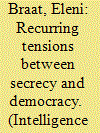

|
|
|
|
|
| Summary/Abstract |
There is a recurring tension between secrecy and democracy. This article analyzes the continually ambiguous relations between intelligence and security agencies and their parliamentary principals. I present a novel conceptual framework to analyze political relations influenced by secrecy. I draw on Albert Hirschman's concepts of exit, voice and loyalty and Max Weber's ideal types of the ethics of conviction and responsibility. The focus is a case study of the Dutch parliament and Security Service between 1975 and 1995. The analysis demonstrates how parliament can deal constructively with the secret services. This depends both on party-political responses to secrecy and strategic responses on the part of the secret services to deteriorating relationships with parliament.
|
|
|
|
|
|
|
|
|
|
|
|
|
|
|
|
| 6 |
ID:
145239
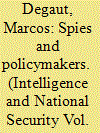

|
|
|
|
|
| Summary/Abstract |
Massive changes and continuous developments in the uses and applications of technology and communications have changed the way we see the world. The Information Revolution has had an impact upon intelligence collection, processing, analysis, and dissemination, and upon the way policymakers can access reliable information, in a timely manner, and upon the sources they are most likely to rely on when a specific piece of information is needed to support a decision. This study attempts to describe, analyze and explain the nature of the ongoing Information Revolution, to present its main impacts on the intelligence and policy communities, to discuss the relationship between the Intelligence Community and policymakers, and to propose what the IC should do to meet the high expectations of decision-makers.
|
|
|
|
|
|
|
|
|
|
|
|
|
|
|
|
| 7 |
ID:
145243
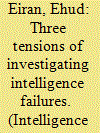

|
|
|
|
|
| Summary/Abstract |
This paper offers a framework for analyzing governmental inquiries into intelligence failures. The paper argues that all investigations face three inherent tensions over their timing, purpose, and process. The benefits and disadvantages of conducting inquiries immediately after the intelligence failure or years later, engaging in investigations designed to ascribe blame or find solutions to endemic intelligence problems, and conducting adversarial, legal-style investigations or collaborative inquiries, are all discussed. In many cases, but not always, the two first tensions are exacerbated by the politicization of the inquiry. Using examples from governmental inquiries around the world, the paper investigates each tension and offers some strategies for mitigating them.
|
|
|
|
|
|
|
|
|
|
|
|
|
|
|
|
| 8 |
ID:
145237
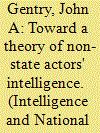

|
|
|
|
|
| Summary/Abstract |
The literature on intelligence contains many laments that scholars of intelligence have not developed widely accepted theories, or even definitions, of intelligence. This paper describes, compares, and modestly theorizes about intelligence-related activities of two variants of non-state actors – violent insurgent/terrorist groups and advocacy NGOs – focusing on their counterintelligence and covert action-like activities. These groups operate in some ways similarly to, and in other ways dramatically different from, states' intelligence services. This comparative analysis extends the scope of intelligence studies and offers suggestions for additional research.
|
|
|
|
|
|
|
|
|
|
|
|
|
|
|
|
|
|
|
|
|